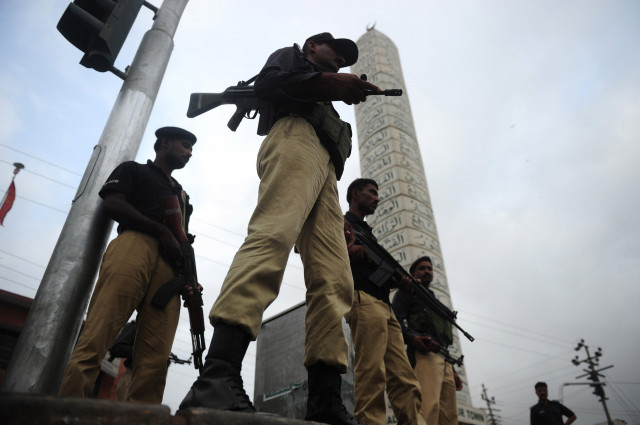Karachi violence case: Police tells SC it cannot lie about no-go areas
IGP submits list of 224 suspects involved in target killings with political affiliations.

Pakistani policemen stand guard in a troubled neighbourhood in Karachi. PHOTO: AFP/ FILE
In a move which left many with their eyes wide in disbelief, the acting inspector-general of the Sindh police handed over the Supreme Court a list of 224 suspects involved in target killings and other heinous crimes - with their political affiliations. The list has, however, yet to be made public.
The province’s acting IG, Ghulam Shabbir Shaikh, made the move on Thursday, during a hearing on the implementation of the Karachi violence case at the Supreme Court’s Karachi registry. The five-member larger bench, headed by the Chief Justice of Pakistan, Iftikhar Muhammad Chaudhry, raked the top brass from the Sindh police and Rangers over the coals for their failure to wipe out the no-go areas in the city. Other members of the bench were Justice Jawwad S Khawaja, Justice Khilji Arif Hussain, Justice Amir Hani Muslim and Justice Ejaz Afzal Khan.
Back in October 2011, the apex court had ordered law enforcers in the city to hunt down all those who were challenging the writ of the state and fortifying themselves in areas where even law enforcers fear to tread. Throughout the previous hearings on the implementation of the apex court’s orders, the Rangers had insisted that no-go areas simply did not exist. They submitted a written report in court, which stated the same thing.
The chief justice made it clear that he felt otherwise. “We asked you to eliminate all no-go areas in Karachi. But it appears as if the entire city is a no-go area. If you don’t agree, let’s go to Orangi Town and Manghopir,” he asked. “Who is stopping you from doing this? Just name the person who is creating hindrances - we’ll toss him into jail.”
Perhaps Justice Khawaja felt that the Rangers simply didn’t understand what qualified as a no-go area, so he decided to lay the parameters, clear and simple: A no-go area is a one where the Rangers need to send a battalion of at least 200 personnel to step into the area.
The hearing then rolled around to Lyari - an area which bleeds profusely because an on-going gang war. While the Rangers submitted that the locality was as peaceful as any other in Karachi, DIG Shahid Hayat accepted that the area was indeed a place where law enforcers fear to tread. In response to the Rangers’ claims, the chief justice had a simple solution: “The director-general of Rangers should submit a certificate saying that Lyari is clear. He’s going to be responsible for anything that happens in the area after that.”
The bench then ordered DIG Hayat, to arrest the killers of Arshad Pappu - the gangster who was found dead on March 17 - on Friday. Law enforcers have also been ordered to iron out a joint strategy to purge the city of no-go areas. “You have police, Rangers and frontier constabulary. You have all the tools. Go and implement the orders,” the chief justice told DIG Hayat.
What about the top cop?
Earlier, the bench had ordered the government appoint a permanent IG for Sindh. The apex court was not pleased to hear on Thursday that this has yet to be done. The additional chief secretary, Arif Khan, assured the judges that this would be done before midnight strikes, as he has spoken to the chief minister about the issue.
The appointment controversy
The court then asked the chief secretary about the posting of 14 officials in the police department on contract, even though it had ordered for all such appointments to be cancelled as the men were all retired officers. Khan argued that the appointments had been made in accordance with Section 14 of the Civil Servant Act, but the bench said that the appointment of retired officers to high posts would only demoralise law enforcers. The bench has ordered for the 14 officials to appear in court today.
Published in The Express Tribune, March 22nd, 2013.



















COMMENTS
Comments are moderated and generally will be posted if they are on-topic and not abusive.
For more information, please see our Comments FAQ